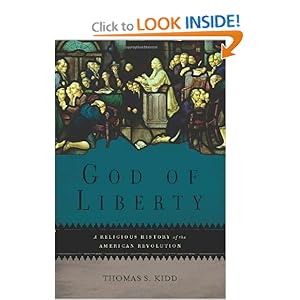Surveying Religious Knowledge: The Founding Fathers, and the Pew Poll
 Paul Harvey
Paul HarveyFor anyone interested, an announcement from History News Network:
Join Thomas Kidd, author of God of Liberty: A Religious History of the American Revolution for a live Q&A on HNN's Ning Network at 3 p.m. Eastern on Wednesday, October 13.
Kidd's take on the poll of Americans' religious knowledge, which Chris Jones blogged about here a few days ago, may be found at "The Founding Fathers Would be Shocked at Our Religious Ignorance." He makes the point that the relatively high degree of religious knowledge evinced by skeptics, noted by the recent pollsters, is not new.
Over at Immanent Frame, a variety of other scholars offer their views on, and take a number of shots, at, the Pew Poll: Surveying Religious Knowledge. In her contribution, Kathryn Lofton asks, if a person is polled about rock and roll history and is unable to identify Big Mama Thornton, does this make them ignorant of rock and roll history? She continues:
For now, I can only observe that a survey which pits religious groups against one another in a Quiz Bowl, and which imagines that praying Protestants ought to know the authority of Martin Luther, tell me very little about religious knowledge, and tell me even less about what the humanities do to serve such a surveyed public. It may be that we live in a budgetary time that begs for base descriptions of our basic (un)knowing. I would only warn that the minute we believe the answers we offer begin with multiple choice questions is the same minute when we cede our complexity to that formation of ignorance.
Join Thomas Kidd, author of God of Liberty: A Religious History of the American Revolution for a live Q&A on HNN's Ning Network at 3 p.m. Eastern on Wednesday, October 13.
Kidd's take on the poll of Americans' religious knowledge, which Chris Jones blogged about here a few days ago, may be found at "The Founding Fathers Would be Shocked at Our Religious Ignorance." He makes the point that the relatively high degree of religious knowledge evinced by skeptics, noted by the recent pollsters, is not new.
Over at Immanent Frame, a variety of other scholars offer their views on, and take a number of shots, at, the Pew Poll: Surveying Religious Knowledge. In her contribution, Kathryn Lofton asks, if a person is polled about rock and roll history and is unable to identify Big Mama Thornton, does this make them ignorant of rock and roll history? She continues:
For now, I can only observe that a survey which pits religious groups against one another in a Quiz Bowl, and which imagines that praying Protestants ought to know the authority of Martin Luther, tell me very little about religious knowledge, and tell me even less about what the humanities do to serve such a surveyed public. It may be that we live in a budgetary time that begs for base descriptions of our basic (un)knowing. I would only warn that the minute we believe the answers we offer begin with multiple choice questions is the same minute when we cede our complexity to that formation of ignorance.

Comments
There are many whose faith is "like that of children," and does not require great learning, exegesis, or history. [And certainly not affected by who Vishnu is, one of the poll questions.]
As everyone here knows, there was a backlash among the New England elite against the First Great Awakening, and Charles Chauncy was quite miffed about the unsophisticated "exhorters" who had the temerity to preach and witness to the Gospel:
"They are chiefly, indeed, young persons, sometimes lads, or rather boys; nay, women and girls, yea, Negroes, have taken upon them to do the business of preachers."
Chauncy was a creature of his times, of course, but leaving the Gospel to the ecclesiastic "professionals" was a European thing, not an American one. Ms. Lofton quite properly suggests that faith is not necessarily an intellectual exercise; it's those who treat it as such who are the ignorant ones.